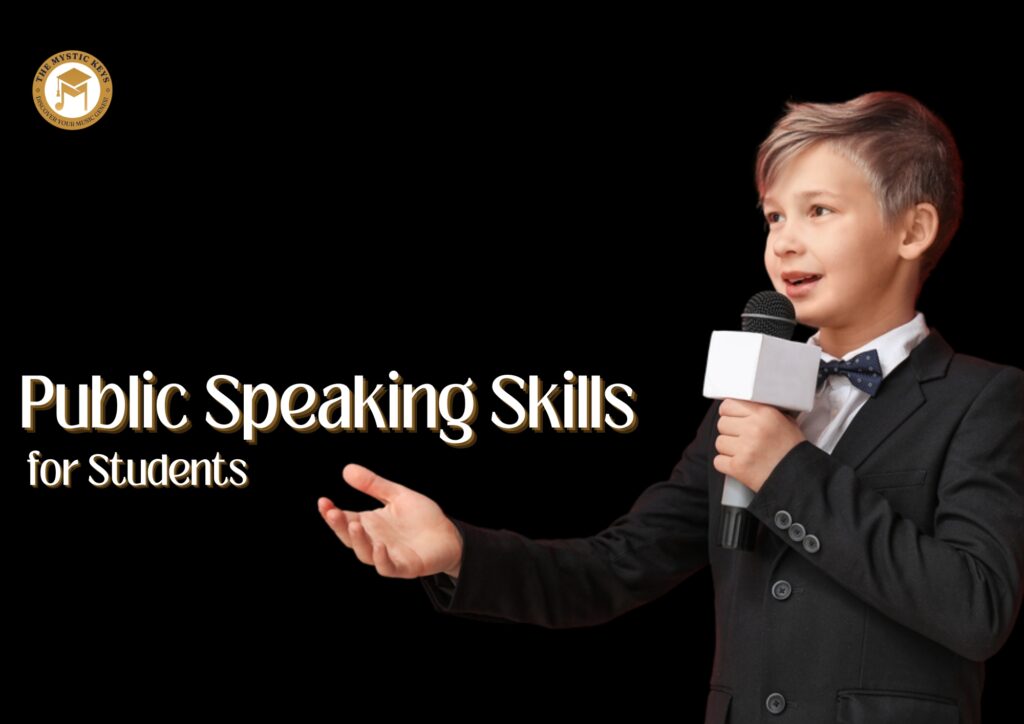Public Speaking Skills for Students | Key to Confidence & Success
Public speaking is an invaluable skill that can significantly shape a student’s academic, personal, and professional journey. It empowers individuals to express themselves effectively, share ideas confidently, and make a lasting impact on their audience. Moreover, for students, mastering public speaking can lead to enhanced self-esteem, improved academic performance, and better preparation for future careers. As such, public speaking becomes a tool for personal and academic growth. In this blog, we will explore the importance of public speaking for students, outline strategies to improve these skills, and discuss effective ways to overcome common challenges.

Why Public Speaking Matters for Students
1. Boosts Confidence
Public speaking pushes students out of their comfort zones and challenges them to face their fears. The act of delivering a speech in front of an audience fosters self-assurance, helping students develop confidence not just in speaking but also in approaching life’s challenges.
2. Enhances Academic Success
From oral presentations to group discussions, public speaking is embedded in academic life. Students with strong speaking skills excel in these areas, as they are better able to articulate ideas and present their work effectively.
3. Develops Leadership Skills
Leadership requires the ability to communicate vision and inspire action. Public speaking nurtures leadership qualities in students by teaching them how to influence others, present compelling arguments, and engage an audience.
4. Prepares for Real-World Challenges
Whether it’s presenting in a meeting, negotiating deals, or addressing a crowd, public speaking is a core skill in many professions. Students who hone this ability early on are better prepared for the demands of the modern workplace.

The Personal Benefits of Public Speaking
1. Overcoming Fear
Many people struggle with glossophobia (the fear of public speaking). By facing this fear early, students build resilience and learn how to handle nerve-wracking situations with poise.
2. Strengthens Emotional Intelligence
Public speaking encourages students to connect with their audience on a deeper level. It helps them understand audience emotions, anticipate reactions, and tailor their tone accordingly.
3. Improves Social Interaction
Public speaking is not limited to delivering speeches—it also enhances everyday conversations. Students become better at articulating their thoughts and engaging in meaningful dialogues.

How to Develop Public Speaking Skills
Mastering public speaking is a gradual process that requires practice, preparation, and a willingness to improve. Below are actionable strategies for students to build their speaking prowess.
1. Start with the Basics
- Practice speaking in front of a mirror to observe facial expressions and gestures.
- Record yourself to identify areas for improvement.
- Begin with simple topics that you are comfortable with.
2. Join Public Speaking Groups
Organizations like Toastmasters or school debate clubs provide structured environments where students can practice speaking in front of peers and receive constructive feedback.
3. Learn from Experts
- Watch TED Talks or YouTube videos of skilled speakers.
- Analyze how they use voice modulation, gestures, and storytelling techniques to captivate their audience.
4. Prepare and Rehearse
- Write a clear outline of your speech, including an introduction, body, and conclusion.
- Rehearse multiple times to familiarize yourself with the content and reduce nervousness.
5. Focus on Body Language
Non-verbal communication plays a significant role in public speaking. Maintain eye contact, use purposeful gestures, and adopt a confident posture.
6. Develop Active Listening Skills
Great speakers are also great listeners. Engage in discussions, listen to others’ viewpoints, and incorporate feedback into your speaking style.

Public Speaking Techniques for Engaging Audiences
1. Use Stories and Examples
Storytelling is a powerful way to connect with an audience. By sharing personal anecdotes or relatable examples, you make your speech more memorable and impactful. Stories invite the audience into your world, making your message more relatable and emotionally resonant. Additionally, they can simplify complex ideas, helping the audience grasp and remember your message more effectively.
2. Ask Questions
Involving the audience by asking questions or seeking their opinions not only keeps them engaged but also fosters a sense of connection. Moreover, it encourages active participation, making the audience feel more involved in the conversation. As a result, this interaction creates a dynamic environment where listeners are more likely to pay attention and respond positively to the speaker.
3. Vary Tone and Pace
Monotonous delivery can easily bore your audience. Therefore, it’s essential to vary your tone, pitch, and pacing throughout your speech. By doing so, you can emphasize key points, add energy to your delivery, and maintain the audience’s interest from start to finish. Additionally, changing your vocal dynamics keeps the speech engaging, ensuring that your audience stays connected and focused on your message.
4. Practice Active Pauses
Strategic pauses not only give your audience time to absorb information, but they also add dramatic effect to your delivery. By pausing at key moments, you allow your listeners to reflect on what has been said, creating anticipation for what comes next. Furthermore, these pauses help emphasize important points, making your message more impactful and memorable.
5. Incorporate Visual Aids
Using slides, props, or charts can significantly enhance your presentation. Not only do they add visual interest, but they also help explain complex ideas more effectively. In addition, these visual aids can break down information into digestible chunks, making it easier for your audience to follow along. Furthermore, incorporating such tools allows you to highlight key points, ensuring that your message is both clear and memorable.

Overcoming Common Challenges in Public Speaking
1. Managing Stage Fright
Practice relaxation techniques like deep breathing or meditation before stepping on stage to calm your nerves. Additionally, shift your focus from fear to the importance of your message. This helps boost your confidence and reduce anxiety. By focusing on the impact of your words, you’ll feel more grounded and in control.
2. Dealing with Unexpected Situations
Not every speech will go as planned. Interruptions, technical issues, or unexpected questions are common. Stay calm and handle them with composure, taking a deep breath and responding confidently. Remember, how you manage these situations can demonstrate your poise and professionalism.
3. Addressing Time Constraints
Time limits can be tricky, but timed rehearsals are key. Practicing within time constraints helps you control pacing and prioritize key points, ensuring a concise and effective delivery. With enough practice, you’ll become more adept at fitting your message within the allotted time.
4. Handling Criticism
Negative feedback can be tough, but view it as an opportunity for growth. Instead of feeling discouraged, reflect on the feedback and use it to improve your skills for future speeches. Constructive criticism can sharpen your abilities and help you become a more effective speaker.

Practical Exercises to Enhance Public Speaking Skills
1. Impromptu Speaking
To begin with, challenge yourself to speak for one minute on a random topic. This not only builds quick thinking but also enhances your adaptability, allowing you to respond effectively in real-time situations.
2. Role-Playing
Furthermore, engage in role-playing exercises where you adopt different personas or scenarios. This approach not only enhances creativity but also broadens your comfort zone, thereby making you more versatile as a speaker. Additionally, by stepping into various roles, you can develop a deeper understanding of different perspectives, which ultimately helps you connect better with diverse audiences. As a result, these exercises foster adaptability and strengthen your overall public speaking skills.
3. Record and Review
In addition, it’s beneficial to make a habit of recording your speeches and reviewing them critically. By doing so, you can easily identify areas for improvement, such as posture, tone, and delivery. Furthermore, this practice allows you to refine your overall performance, ensuring that you continuously enhance your public speaking skills.
4. Participate in School Events
Lastly, take advantage of opportunities to participate in school events. Whether it’s debates, declamation contests, or even serving as an MC, these real-world experiences provide invaluable practice and help you apply your skills in a dynamic environment.

The Long-Term Impact of Public Speaking
1. Building a Strong Personal Brand
To begin with, public speaking sets students apart by showcasing their ability to articulate ideas confidently. Furthermore, it demonstrates their capability to convey messages with clarity and poise, which is a critical trait in both academic and professional settings. As a result, this ability helps students build a strong personal brand that stands out and leaves a lasting impression on peers, mentors, and future employers.
2. Enhanced Career Opportunities
Moreover, in today’s competitive job markets, excellent communication skills are a significant advantage. For instance, public speaking enables candidates to present ideas clearly and confidently, which is highly valued by employers. In addition, the ability to lead discussions effectively positions students as proactive and capable team members. Consequently, these skills open doors to enhanced career opportunities and greater professional success.
3. Lifelong Learning
Finally, public speaking is a lifelong skill that evolves continuously with practice. Over time, as students grow and gain more experience, their ability to communicate effectively will influence various aspects of their lives. For example, strong speaking skills will help them foster meaningful relationships, build trust in personal and professional settings, and advance their career growth. Thus, public speaking not only serves immediate purposes but also becomes a valuable asset for lifelong learning and self-improvement.

Inspiring Success Stories of Student Public Speakers
History is full of inspiring examples of individuals who developed public speaking skills for students and later used them to make a lasting impact. For instance, Warren Buffett, one of the world’s most successful investors, attributes much of his confidence and career success to public speaking courses, which he credits for transforming his ability to communicate effectively. Similarly, Emma Watson, celebrated for her powerful speeches on gender equality, began honing her public speaking skills during her school years, laying the foundation for her compelling advocacy work. These stories not only highlight the importance of public speaking skills for students but also underscore their transformative power to change lives, open doors to new opportunities, and empower individuals to make a meaningful difference.


Conclusion | The Power of Public Speaking for Students
Public speaking skills for students are a powerful tool for empowerment and self-expression. By developing these skills, students can overcome their fears, communicate effectively, and inspire others. Public speaking helps students articulate ideas clearly, engage their audience, and build confidence. With practice and dedication, anyone can become a compelling speaker.
Encourage yourself or those around you to start small, take risks, and seize every opportunity to speak publicly. Each experience contributes to growth. The journey may be challenging, but the rewards—confidence, leadership, and new opportunities—are worth it.
To fast-track your progress, join our Public Speaking Course Online today and develop the skills to speak confidently in any setting.
For more resources about music education, public speaking, and much more, visit The Mystic Keys. You can also follow us on our social media platforms for exciting content and updates: Facebook, Instagram, YouTube, LinkedIn, Twitter, Pinterest, Reddit, Threads, and Quora for exciting content and updates.








